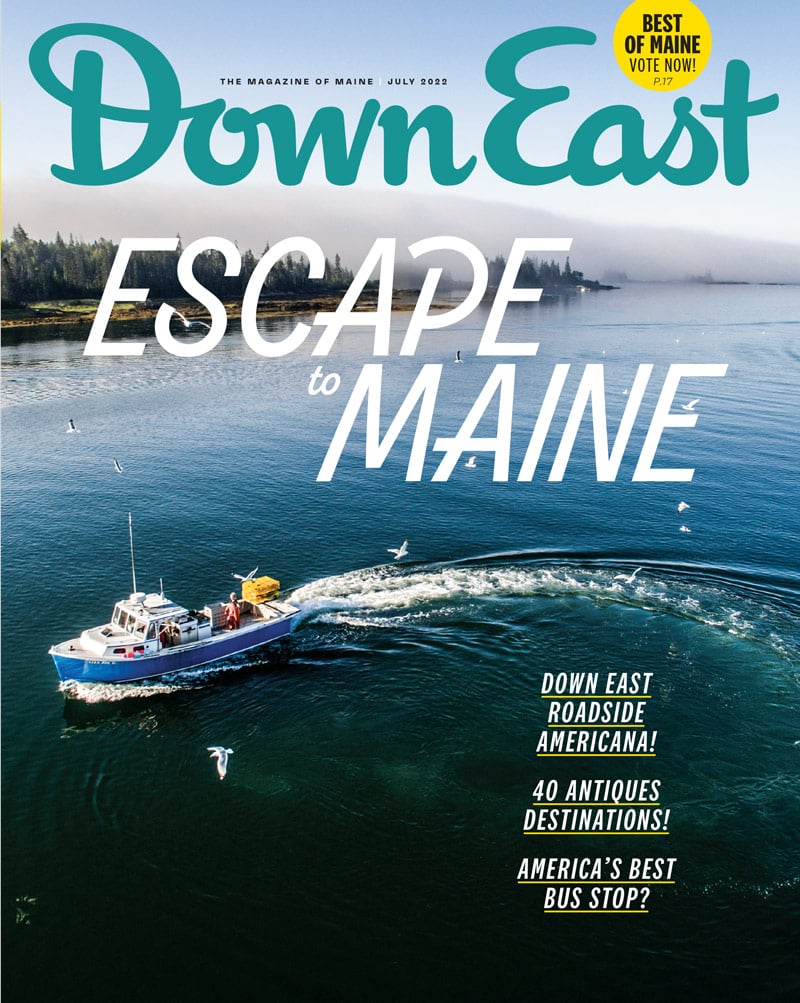By Philip Conkling
Photograph by Peter Ralston
From our July 2022 issue
New Englanders have been pulling wondrous amounts of seafood out of the ocean for centuries, but how much do we know about our backyard, the Gulf of Maine? A lot, fortunately, thanks to oceanographers like Henry Bigelow, who set thousands of drift bottles loose along Maine and Massachusetts coasts in the early 1900s and demonstrated that the Gulf of Maine is a “sea within a sea.” Ocean currents circle in a giant counterclockwise gyre from Nova Scotia to Cape Cod and back around, Bigelow proved, and later scientists located smaller gyres spinning within the main one. Because the Gulf of Maine is also relatively shallow, most of its prodigious productivity gets cycled and recycled into rich and complex food webs.
If we ate primary producers, algae or seaweed, we’d never starve. But we humans have very specific tastes: we like cod for fish sandwiches and filets, and nearly everyone on the planet loves Maine lobster. We owe a big cultural debt to Maine fishermen, who have supplied us delicious, locally produced protein, free of feedlot hormones.
Beginning in the 1990s, various marine scientists predicted that Gulf of Maine cod populations were on the brink of collapse. Fishermen insisted they knew better. Scientists couldn’t adequately monitor populations of cod, because they, unlike the fishermen, knew too little about where the fish would congregate. To every fishery regulation proposed to reduce the cod harvest, cod fishermen had a simple strategy: just say no.
Turns out, the fishermen were wrong and the scientists were right. Last year, Maine fishermen brought in fewer than 50,000 pounds of cod, the lowest catch in recorded history, in contrast to more than 20 million pounds — 400 times as much — during the industry’s peak in the ’90s. Regulations and warming ocean temperatures undoubtedly contributed to this catastrophically reduced catch, but at the end of the day, fishermen simply found the last pockets of the once-great Gulf of Maine cod schools and caught nearly all of them.
Ironically, the collapse of the cod fishery has benefited the lobster fishery, since cod are ferocious predators of lobsters. Last year was a banner year for Maine lobstermen, who landed a catch valued at over $724 million. Among Maine’s 4,500 lobstermen, that’s an average of over $160,000 apiece.
Among those lobstermen are a great number of admirable, hardworking men and women, and their archetype has become a cultural icon. There is no politician in the state who doesn’t want to be identified as a protector of Maine’s lobster industry, especially in an election year. But as the inshore waters of the Gulf of Maine rapidly warm, more and more of the catch comes from offshore waters, beyond the state limit, where the federal government manages the fishery.
Lobstermen are currently fighting battles on two fronts. First, new regulations to protect right whales from becoming entangled in lobster lines offshore have seasonally closed 950 square miles in waters managed by federal regulators charged with enforcing the Endangered Species Act. Maine lobstermen insist that their gear is not responsible for right-whale entanglements and deaths.
On the other front, lobstermen are fighting offshore wind proposals. Their strategy is familiar — just say no. No to the University of Maine’s single-turbine demonstration project off Monhegan (a project on which, full disclosure, I have consulted). No to the governor’s proposed research array, 40 miles offshore, to test the potential impacts of floating turbines on fishing and wildlife. And an emphatic never to any commercial offshore wind farms in the Gulf of Maine, regardless of the state’s climate and energy policies and goals.
“Just say no” is a simple strategy and as in vogue today as ever. But I am reminded of H.L. Mencken’s famous dictum, that every complex problem has a simple answer, and it is always wrong.




